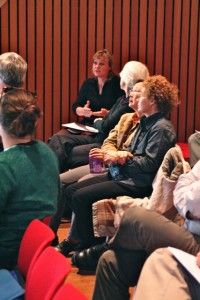The Teaching and Learning committee is possibly one of the most interesting working groups of the Strategic Planning process to current students of Grinnell because it may affect their future classroom experience. As with the other four main working groups of the planning process, the Teaching and Learning group’s task is to answer one of the questions given by the Trustees at the end of the summer: how can we create a powerful and adaptive learning environment?

The committee looks at Grinnell College’s educational goals, what type of experience it needs to provide and how it can build on past success. Although it is critical of Grinnell’s educational practices, it is not meant to gloss over Grinnell’s present academic rigor and achievements but rather as a way of looking ahead and ensuring that Grinnell maintains its academic reputation well into the future.
“Everybody believes that we already have a powerful and adaptive learning environment, but as we look ahead, strategic planning is about saying what will the world look like in five or ten years how will our learning environment and the experience we are providing […] be responsive to that” said Associate Professor of French and Director of the Center for International Studies David Harrison who chairs the Teaching and Learning working group.
The group looked at ideas that center around five emerging questions: How can students be encouraged to share their knowledge, how can mentorship be extended/organized, how can students get a direct experience in their field of study, how to foster creativity and collaboration and how to prepare students to adapt to uncertainties of post-Grinnell life. One important feature of all of these questions is that whatever will come out of the Strategic Planning process will not be changing what defines Grinnell.
“We don’t feel that we are supposed to be changing the mission of the college. And the mission as expressed in the mission statement says […] the college pursues its mission by educating young men and women in the liberal arts through free inquiry and the open exchange of ideas” Harrison said. “We are not about to abandon liberal arts as being the defining feature of this college,” he said.
Some concrete ideas include expanding mentorship in various ways on Campus. For example, the college could expand the peer-mentoring program in the sciences to other subject areas or have Alumni mentor students through independent projects or internships.
“We heard one person give an idea that alumni who are in academia should be outside readers of advanced projects,” Harrison said.
Another idea the committee discussed was making the different resources on Campus more accessible, creating some kind of Academic Commons. This Commons would bring together resources for both research resources and writing resources, for example the Writing Lab. Generally, though the committee bounced several ideas around concerning additions and changes and is now starting to organize these ideas into a coherent plan.
“There are more ideas than we can possibly put into any kind of strategic plan,” Harrison said.
“So what we are trying to do is find what are the larger encompassing ideas that can kind of characterize a series of smaller ones and what are the ones that we think have the most potential for really making the learning environment as powerful as it can be.”
However as it has come up during the group’s presentation this past Monday, the group has not spent much time looking at improving already existing structures.
“I think it was Doug Cutchins who was like we have been talking about new ideas but what about what is already being done, how do we reevaluate that?” said Wadzanai Motsi ‘12, Vice President for Academic Affairs and the Student Government representative on the Teaching and Learning working group. “We could definitely still have more conversation about what do we do to improve the current system.”
One thing that is still needed and appreciated are ideas and concerns that can be either addressed to sp@grinnell.edu, or to Motsi, who is welcoming any feedback through her office hours, email or through the student feedback group to the Teaching and Learning Working Group. This feedback group meets every other Thursday at 8:15 pm in JRC 209.

















































